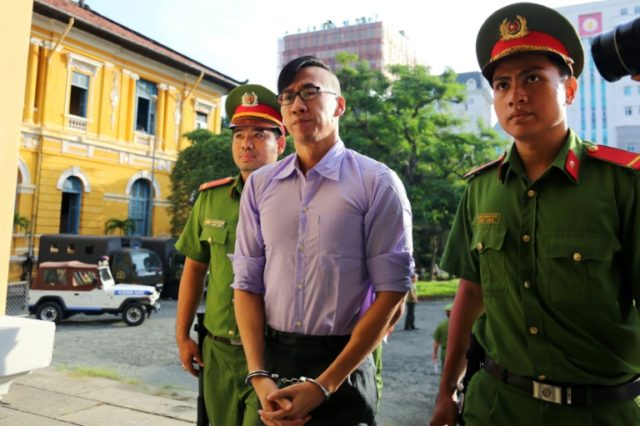The communist government of Vietnam convicted ten people on Monday for having participated in protests against China in the last month, sentencing them to up to three and a half years in prison for allegedly triggering violent mass outbursts around the country.
Widespread protests erupted in some of Vietnam’s largest cities last month attracting tens of thousands of people over a proposed law, the Special Zone Act, to allow 99-year leases on property by foreign corporations. The protesters feared that the government of China, already illegally developing Vietnamese territory in the South China Sea, would take advantage of the law to slowly colonized Vietnamese territory, triggering protests, even though the law itself does not mention China. Vietnam did not go forward with ratifying the law after the protests.
According to Agence France-Presse (AFP), the Vietnamese government announced that ten individuals arrested during those protests had been sentenced to between two and three years in prison on Monday. Among their crimes were “massive attacks against police deployments … injuring some officers, damaging two government vehicles and causing widespread traffic blockages for 15 hours on a national highway,” according to Voice of Vietnam. Some protesters hurled stones and sticks at police to hurt them.
Protests are largely illegal in Vietnam, particularly ones in which property damage or violence occurs. In the anti-Chinese protests, some protesters took to burning police cars and blocking off property while holding anti-China banners.
The protests caught the eye of the American government after the arrest of U.S. citizen William Nguyen, who had traveled to Vietnam to support free expression in the communist country. Nguyen stood accused of “causing public disorder” by encouraging protesters to jump over police barricades and attract more people to the anti-China protests. A Vietnamese judge convicted Nguyen of his public disorder violation last week but ordered him to be deported back to the United States, rather than serve a prison sentence in Vietnam, prompting celebrations by relatives at home. Nguyen observed 40 days in prison.
“I’m tremendously pleased that American citizen William Nguyen will return home to his family from #Vietnam,” Secretary of State Mike Pompeo posted shortly before his release.
China and Vietnam have thousands of years of tense history between them, including several wars and attempts of colonization by China. Protesters last month held up angry signs accusing the government of “selling” the country to China through the lease law and used chants such as “No Special Zone — No leasing land to China — Even for one day!” Protesters told reporters that, despite the absence of China in the text of the law, rumors spread through word of mouth that Chinese-controlled businesses were preparing to abuse the law to begin taking control of as much Vietnamese territory as possible
At the time, Chinese state media dismissed the protests as the work of a loud minority.
“The proposed special economic zone law extends the land lease period of the three special zones in Vietnam to 99 years for investors from all countries,” the state-run Global Times wrote in June, “But a few Vietnamese radicals clamored that the law would lead to Chinese ‘long-term occupation of Vietnamese land.’”
The Vietnamese government has acted to confront concerns about potential Chinese colonization recently, however, independent on these protests. China claims most of the South China Sea, including Vietnam’s territory in the Spratly and Paracel Islands. Despite a 2016 international legal ruling finding that China’s claims are illegal, China has continued crafting artificial islands in the region for military use, alarming Vietnam, among other neighbors. China banned Vietnamese fishermen from parts of Vietnam’s sovereign waters in 2017 and has sunk Vietnamese ships that dare navigate domestic waters China does not approve of them using.
The Vietnamese government has begun its own island-building projects and increased its military presence in the South China Sea, but relies on a much smaller military infrastructure than China’s People’s Liberation Army.

COMMENTS
Please let us know if you're having issues with commenting.